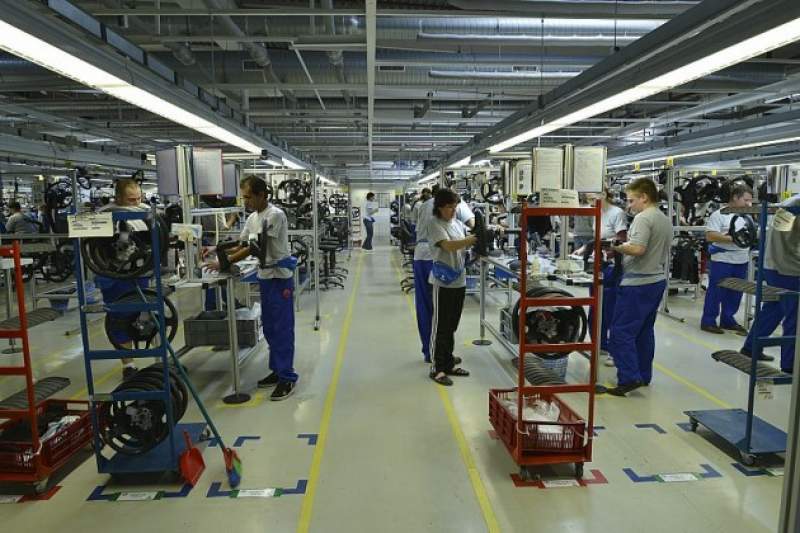There has been a decrease in activity in the manufacturing industry in recent years, affecting a large portion of the automotive industry, especially the part that is based on the production of parts and subassemblies intended for export, characterized by little added value. This is the case for automotive wiring and parts production factories, where the cost of labor is decisive for obtaining profit.
Schaeffler, Leoni, Yazaki, Draxlmaier and Fujikura are reducing their activity, or even selling.
Romania’s industry overall represents about 20% of the country’s economy – on a strong downward trend since 2018 – and industrial products account for three quarters of total exports of goods.
At the beginning of the year, almost one million people were employed in the industry, and the advance or, conversely, the contraction of the sector largely depends on the evolution of the euro zone economy, since most of the goods are exported to Germany, Italy and France.
We can no longer „sell” low wages
One of the industries that had developed strongly was that of automotive wiring, which, similar to the clothing industry, is in sharp decline due to low value added.
Large international manufacturers specialized in cables which had opened factories in Romania – Leoni, Yazaki, Draxlmaier and Fujikura – are reducing their activity.
In the manufacturing industry, the automotive sector is the most developed, contributing overall with nearly 10% to the formation of GDP. However, the largest part is represented by the manufacture of necessary parts and components intended for export to the developed countries of the European Union.
The negative trend in the industry is amplified by the economic stagnation of the main trading partners in the EU, but also by the decrease in competitiveness caused by the increase in production costs.
This can be seen from the decrease in turnover in the branch of the production of intermediate goods which are mostly intended for export after undergoing a certain degree of processing in the country. As with the clothing industry, large companies move their production to countries where labor costs are lower.
The largest cable manufacturer, acquired by a Chinese company
The majority stake in Leoni was acquired this year by Chinese company Luxshore.
Leoni has been active in Romania since 2000, with approximately 12,000 employees in 2024. The company has production units in Arad, Bistrița and Pitești. Other „satellite factories” were opened in Beiuș, Luduș, Marghita and Bumbești-Jiu.
Leoni has 10 factories in Romania in total, with a cumulated production area of 180,000 sqm.
The continuation of production at these factories is uncertain, as industrial units in Asia have an undeniable advantage in energy prices and labor costs.
Yazaki closed its factory in Buzau
Another important company specialized in wiring and electrical equipment for the automotive industry, Yazaki, closed the factory in Buzău that had over 400 employees at the end of last year and announced that it is restructuring the factory in Ploiesti. Yazaki owns two other factories in Romania, in Brăila and Caracal. Last year the company reported a net profit of over RON 100 million.
Parts manufacturers are also reducing their activity
Schaeffler Romania, the third largest company in Brasov county, with a turnover of RON 3.9 billion in 2023 and 4,900 employees, is considering a program of voluntary redundancy, the company showing that „the business environment in which we operate remains challenging, affecting our bearings and industrial solutions division”.
In 2023, the net profit reported by the company fell by 60%, to only RON 36 million, while the turnover rose by 11% to RON 3.9 billion, according to public information.
Industry data, pessimistic – following European competitiveness trend: production facilities utilization in decline
The manufacturing industry as a whole is suffering from reduced orders, which is evidenced by the degree of utilization of production facilities.
The sector is affected on the one hand by rising energy prices and labor costs.
Labor productivity is shrinking compared to the pre-pandemic period, which reduces competitiveness of the Romanian industry.
Of the total output from units in the field of electrical equipment manufacture, a large part of the activity consists of operations of low complexity, where the cost of labor is important for the cost of production. As salaries go up, the number of orders decreases, while investors look to countries with cheaper labor.
The clothing industry example – where outward processing moved in and dismantled the sector
Outward processing in industry and its evolution seems to faithfully follow the fate of clothing manufacturing, a high-priced sector 2-3 decades ago. Clothing industry simply collapsed, the main cause being the rapid rise in wages and competition from countries with higher productivity. Thus, in 2023 alone, the number of employees in clothing, leather goods and footwear industry diminished by 8,000 and the number of companies dropped by almost 10%. Overall turnover fell by 6%. And the migration process of clothing and footwear manufacturers and retailers to countries in Asia and North Africa, outside the EU where wages are lower, continues.
***















